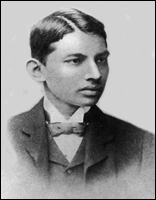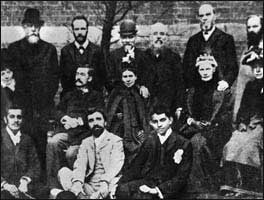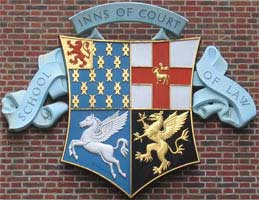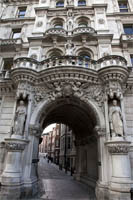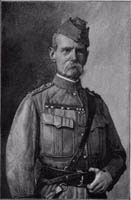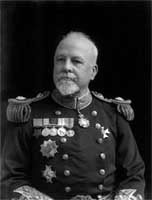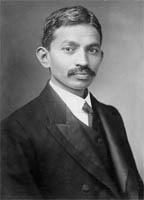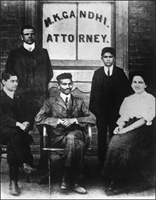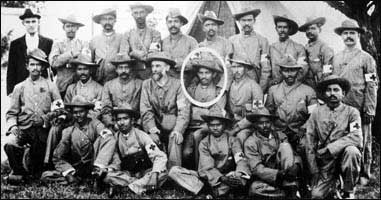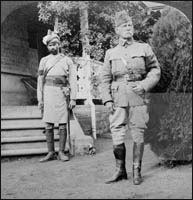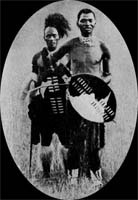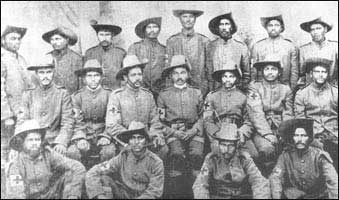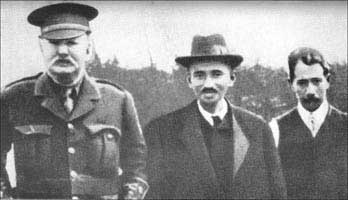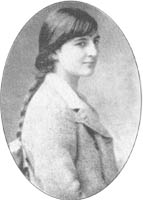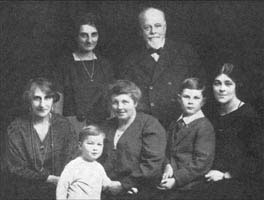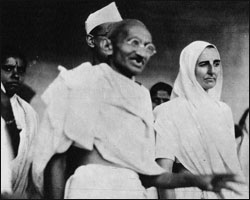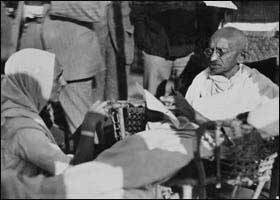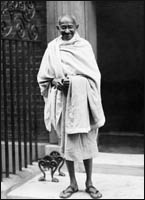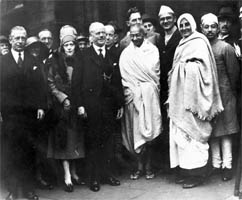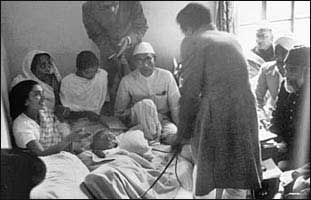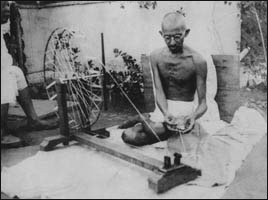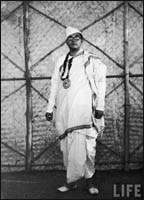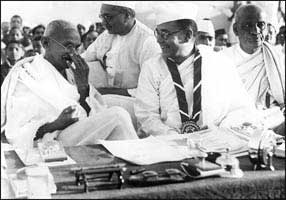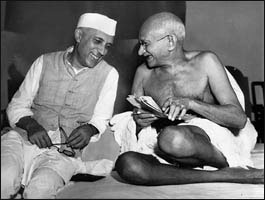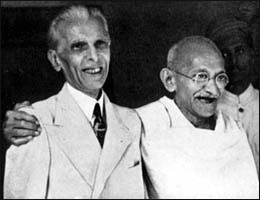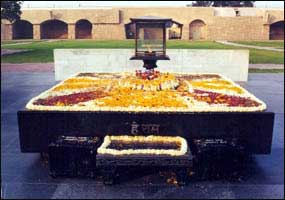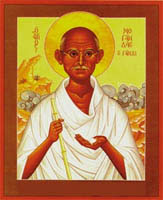Mohadas Gandhi was born just 5 years before the East India Company dissolved.....As a matter of fact, the Company did a disappearing act by merging with the British Government! That merger meant that the Company controlled the roaring lion's share of worldwide trade! It was like the dissolution of Rockefeller's Standard Oil Company in 1911, when the component parts emerged bigger and stronger than ever!
The East India Company was determined to retain the "Jewel in the Crown" at any cost, and that necessitated saturating India with British trained spies. Mohandas Karamchand Gandhi was born on October 2, 1869, in Gujarat, western India. His father was a poor Hindu merchant who died in 1885. Gandhi received the Indian equivalent of a U.S. High School Diploma in 1887:
Gandhi attended Samaldas College in Bhavnagar, but after the end of the first term he had to drop out because he could not understand the English language. Here is an excerpt from a biography of Kastur Gandhi, spouse of the spy: The months passed but not quickly enough for Mohan. He had realized almost from the day of his arrival at Samaldas College that he was floundering. He understood little that was said in classes. Lessons were conducted in English; his marks were abominable; he was fighting loneliness, frustration, and an oppressive awareness that he was soon to assume the responsibilities of parenthood. When his first term ended in May, he quit the college and went home to Kastubai determined never to return to Samaldas College. (Gandhi, The Forgotten Woman: The Untold Story of Kastur, Wife of Mahatma Gandhi, pp. 34-34). It was soon after he dropped out of college that a "friend" suggested that he go to Britain and study to become a "barrister."
Like fellow spy Muhammad Ali Jinnah, Gandhi could have entered the Inns of Court after graduating from a university in India, but he had neither the brains, or the money, to pursue a legal career. 2 committed British imperialists were responsible for recruiting Gandhi as a spy and paying for his expenses while undergoing training in London.
Gandhi was not charged any tuition while he studied at the spying school, so admiral Slade was only responsible for his living expenses while in London. The "Apostle of Non-violence" had the backing of 2 of the top military men in the British Empire....While he was staying in London, Gandhi forgot to mention his benefactor admiral Slade . . . or staying at his country mansion, Milton Heath. In June 1891, his spy training completed, he sailed home to India. When he arrived home to Bombay, no adoring crowds greeted him because the Gandhi legend was not yet born:
Gandhi need not have worried about his future as a "lawyer" because admiral Slade and the British Raj was committed to taking care of the financial needs of all of their spies!!. Gandhi fought for the British during the brutal Boer War!!In 1893, Gandhi sailed for South Africa. Until the discovery of gold in South Africa, the Cape Colony was just a stopover on the passage to India.
Upon arriving in South Africa, Gandhi started practicing law. He returned to India on July 4, 1896, to collect his family from Jajkot. In 1899, the very man who had recommended him for training in Britain, Lord Roberts, arrived in Cape Town, determined to steal the gold from the Boers.
Lord Roberts was the architect of the brutal concentration camp system for Boer women and children. Gandhi never seemed to be bothered by the abysmal treatment of innocent women and children . . . as long as it was for the good of the British Empire!! Once the British Empire defeated the Boers, the vast quantity of gold was shipped to the Bank of England in London. That gold was used by the British to finance the Kaiser and the German military buildup prior to WWI. The gold was also used to finance the Russian Revolution!!
The Bambatha Uprising was a Zulu revolt against British rule and taxation in Natal, South Africa, in 1906. The revolt was led by Bambatha kaMancinza, leader of the amaZondi clan of the Zulu people, who lived in the Mpanza Valley, a district near Greytown, KwaZulu-Natal. Unlike the Boors, the natives fought with swords and spears and they were no match for the superior firepower of the British Empire. The death of Chief Bambhatha brought an end to the conflict. Mohandas Gandhi sailed for England in July 1914—just in time for World War I.
To his big disappointment, Gandhi never served on the Western Front because he fell ill with pleurisy and was unable to fill his command tasks. He sailed for India on December 19, and reached Bombay on January 9, 1915. Gandhi's propaganda press had preceded him and this time he was hailed as a hero of non-violence and civil rights for the oppressed. The legend of Gandhi was born and a Nobel prize winning poet named Rabindranath Tagore gave him the flattering title Mahatma or "great soul."Mirabehn was Gandhi's liaison with the British Secret Service!!Madeline Slade followed in the footsteps of her "intelligence officer" father. According to her biography, she fell in love with Gandhi after a French writer named Romain Rolland called him "another Christ" and the greatest figure of the 20th century....Nothing could be further from the TRUTH, she met Gandhi while he was training in London.
Madeline Slade sailed for India in October 1925, and she arrived at Gandhi's Ashram on November 7. Madeline provided the funds from the Bank of England for Gandhi's passive resistance or satyagraha. Gandhi's adoring devotee claimed that the relationship was purely platonic!!
Gandhi was treated like a celebrity when he arrived in London in 1931. He met Prime Minister Ramsey MacDonald, and he had tea with the king at Buckingham Palace. He toured the Lancashire linen mills that supplied the huge Indian market.
The financial stakes were enormous for Britain because India was a "captive market" and dumping ground for most of her manufactured goods. As expected, Gandhi played his part as a spy very well and he returned to India empty handed. Gandhi fasted to keep the East India Company in India!!Winston Churchill was determined to keep India a part of the East Inida Company at any cost. He overlooked no weapon–no matter how insignificant–to accomplish this. As well as being a master of disguise, Gandhi had another unique talent for a spy: the ability to fast....Churchill loved the idea of fasting and non-violence because it would accomplish absolutely nothing to free India . . . except help his spy Gandhi to lose weight . . . and live longer.
Churchill the Druid never did much fasting but that discipline is a vital part of Hinduism. When Westerners visit India seeking the "wisdom" of the Hindus, or to contact their dear departed loved ones, the gurus tell them to go on long fasts . . . and then they will be able to make contact with the dead . . . or communicate with the unseen powers of the universe!! Fasting for power over Satan is also highly recommended in the Holy Bible but it tells us not to advertise when we fast. The Messiah of Israel said:
The emaciated frame of Gandhi spinning a yarn became famous throughout the world. Gandhi forced Subhas Chandra Bose to resign from the Presidency!!Subhas Chandra Bose was the real hero of Indian independence and the true FATHER of the Indian Republic. From the very beginning of his quest for Indian freedom from British oppression, he was mightily opposed by Gandhi . . . even to the stratagem of having him poisoned.
As Congress President, Bose worked tirelessly to lay the groundwork for Indian independence and unity:
In January 1939, Mr. Bose was reelected to Congress for another year. Gandhi was highly displeased with the result of the election. After visiting him, Bose fell dangerously ill:
Unable to get any cooperation from Gandhi, Bose resigned from the Presidency on April 29, 1939. This was a momentous moment for India, as World War II was about to erupt in Europe, and a chance for India to gain independence from Britain. Gandhi presided over the partition of India in 1947!!Subhas Chandra Bose would never have agreed to the partition of India into warring factions. The partition of India caused a dreadful civil war between Hindus and Muslims. Gandhi's answer to the millions who were uprooted from their homes was to FAST.
In 1947, India was partitioned and 2 hostile nations were created where one nation had existed for 4,000 years. The British divide and rule strategy was applied, with Hindus, Sikhs, and Muslims divided along ethnic lines. After the partition in 1947, a further partition took place in 1971 with the creation of Bangladesh. More countries mean more wars and wasteful military expenditures which could be used to improve the lives of the people.
The false religion of Hinduism teaches an endless cycle of rebirth or reincarnation, until a soul merges with the divine essence of the universe. Nothing could be further from the TRUTH. Saint Paul had Hinduism in mind when he said:
Cremated or buried, all will be resurrected on the Last Day:
If "Saint" Gandhi had taken any time to read the Holy Bible he would have soon discovered that spies are despicable. Vital Links References Bose, Sugata. His Majesty's Opponent. Subhas Chandra Bose and India's Struggle for Independence. Harvard University Press, 2011. Gandhi, Mohandas K. An Autobiography: The Story of My Experiments With Truth. Beacon Press, Boston, 1957. Gandhi, Arun & Sunanda. The Forgotten Woman: The Untold Story of Kastur, Wife of Mahatma Gandhi. Ozark Mountains Books, Huntsville, Alabama, 1998. Herman, Arthur. Gandhi & Churchill: The Epic Rivalry That Destroyed An Empire and Forged Our Age. Bantam Books, New York, 2008. Mirabehn, The Spirit's Pilgrimage. Great Ocean Publishers, Arlington, Virginia, 1960. Roberts, Frederick Sleigh. Forty-One Years in India, From Subaltern to Commander-in-Chief. R. Bentley, London, 1897. Singh, G.B. Gandhi: Behind the Mask of Divinity. Prometheus Books, Amherst, New York, 2004. Copyright © 2014 by Patrick Scrivener |
